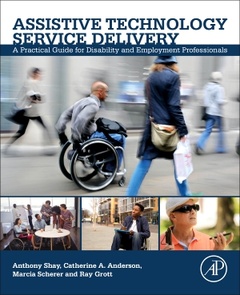Description
Assistive Technology Service Delivery
A Practical Guide for Disability and Employment Professionals
Coordinator: Shay Anthony
Language: English
Subject for Assistive Technology Service Delivery:
Keywords
Accessibility; Accommodation system; Accommodations; Activity limitation; Ambits of influence; Assessment Matching Person and Technology; Assistive technology; Assistive technology assessment; Assistive technology implementation; Assistive technology implementation process; Assistive technology installation; Assistive technology model; Assistive technology outcomes; Assistive technology problem-solving; Assistive technology research priorities; Assistive technology selection; Assistive technology service delivery; Assistive technology service delivery process; Assistive technology service stages; Assistive technology services; Assistive technology solutions; Assistive technology training; Autotelic enablement; Barriers to assistive technology; Case management; Case note; Communication; Compensatory strategy; Consumer-driven; Context; Criteria for good service delivery systems; Cultural competence; Decision-making; Dialog; Disability; Employment elements; Environment; Environmental factors; Environmental optimization; Evidence-based practice; Feature matching; Functional limitation; Goal striving; Great 8; Hierarchy of solutions; Identity; Identity trajectory; Impact; Impairment; Inclusion; Inclusive design; Interpersonal; Intervention; Knowledge translation; Language; Matching person and technology; Measurement; Model of provision; Motivation; Optimal experience; Other; Outcomes; Participatory design; Personal factors; Poverty; Preintervention; Problem-solving; Rehabilitation; Relationship; Results; Self; Situated experience; Situated learning; Social; Standardization; Subjective experience; Task engagement; Technology abandonment; Technology discontinuance; Underserved; Universal design; Usability; User involvement; User-centered design; Vocational competence
260 p. · 19x23.3 cm · Paperback
Description
/li>Contents
/li>Biography
/li>Comment
/li>
Assistive Technology Service Delivery: A Practical Guide for Disability and Employment Professionals provides professionals working in vocational rehabilitation with the guidelines and methodologies they need to carry out their daily work at a high standard. Crucially, the techniques and tools described in the book are based on evidence gathered in rigorous research. Chapters cover an introduction to the accommodations system, the role of assistive technology as an accommodation and evidence-based practice in vocational rehabilitation, the service delivery process, from referral, through technology procurement and implementation, to the monitoring of outcomes.
Drawing on their extensive experience, the authors then present techniques, tools and tips for assistive technology service delivery, with illustrative case study examples. Written with practicing assistive technology professionals and students in mind, this book translates technical knowledge into content that professionals can understand and readily apply.
1. Introduction and How to Use this Book
Section 1: Staging the Assistive Technology Service Delivery Process 2. Assistive Technology and the Accommodations Model 3. Evidence-Based Practice in Assistive Technology Service Delivery 4. Assistive Technology Strategies, Techniques, Tools, and Tips
Section 2: Overview of the Service Delivery Process 5. The Big Picture: The 50,000 Foot View
Section 3: Assistive Technology Service Delivery Process: Service Entry 6. Referral, Intake and Initial Assessment 7. Systematic Assessment 8. Plan Development, Recommendations and Report Writing
Section 4: Assistive Technology Service Delivery Process: Mid-Process Services 9. Task Analysis 10. Technology Procurement 11. Technology Development
Section 5: Assistive Technology Service Delivery Process: Service Completion 12. Ongoing Training, Support, and Maintenance 13. Follow-Up, Follow Along and Re-Referral 14. Case Closure 15. Consideration of Underserved Groups and Lower Resourced Environments
- Presented in a highly accessible style that translates technical knowledge into content that practicing professionals can understand and readily apply
- Based on evidence-based practice, giving the reader the evidence to support the application of assistive technology in vocational rehabilitation
- Written by highly-regarded assistive technology professionals who share their hands-on experience of applying the techniques, tools and tips covered in the book




